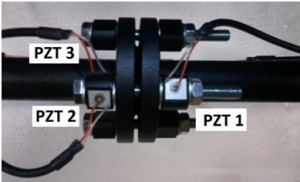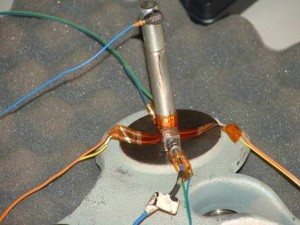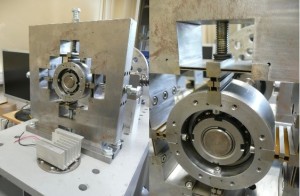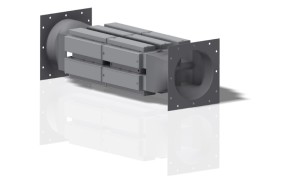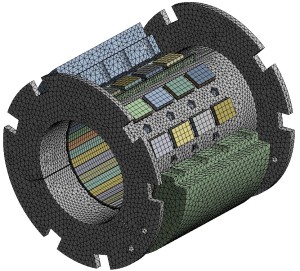RESEARCH TOPICS
RESEARCH TOPICS
Electro-mechanical impedance used for damage detection in mechanical structures
The scope of research work deals with the applicability assessment for electromechanical impedance measurement for damage detection in mechanical structures. The studied topics cover both simulations and experimental tests for selected types of damages: cracks, damages in riveted and welded joints, as well as loosening in bolted connections. In FEA-based simulations full electromechanical coupling is taken into account present in piezoelectric transducers used for impedance measurements. Nowadays, the developed impedance-based SHM system is brought onto the market for commercial applications by the spin-off company – MONIT SHM Sp. z o.o.
The research is coordinated by dr Adam Martowicz
IDT
The research is coordinated by dr Michał Mańka
Shunt damping
The research is devoted to damping mechanical vibration by the use of piezoelectric patches glued to the slender structures. The shunt damping technique has proofed its effectiveness while investigated on the several types of structures starting from the laboratory setups to the real automotive components or even the slalom skis. The performance of shunt damping systems can be determined with large confidence using numerical analysis. The developed in-house software allows to give precise results based on the simple modal tests what significantly shorten the time needed for simulations.
The research is coordinated by dr Michał Lubieniecki
Energy harvesting
The energy harvesting allows to use the energy scattered in the environment in order to power small electronic devices enabling their autonomous and maintenance free operation. Among many possible applications the smart bearing or shunt damping systems are those of great interest. Shunt circuits having bulky inductors or those based on the operational amplifiers need either the power supply or to be tuned to the particular frequency. By exploiting the energy harvesting capabilities they become both adaptive and self-sufficient. The smart bearing system scavenging energy from the heat dissipated in a bearing able to eliminate vibration in a bearing node has been patented.
The research is coordinated by dr Michał Lubieniecki
Waste heat recovery
The research is focused on the application of thermoelectric materials for the waste heat recovery, especially in combination with small ORC turbines. The findings of this research can be used in small (e.g. domestic) CHP plants or small heat recovery applications. The work focuses on the generator topology allowing highest energy density. The generator can be used as a standalone system or as a preheater in ORC systems. The use of additional heat exchanger may contribute to as much as 10% of additional electric energy produced by enhanced ORC system.
The research is coordinated by dr Michał Lubieniecki
Thermal stability
The research focuses on the use of thermoelectric modules for regulation of temperature distribution on the foils of a foil bearing. This special types of bearing may withstand elevated temperatures while working oil-less. The harsh environment they operate in can, however, eventually cause the unpredictable stability issues. The novel approach to the foil bearing stabilization allows to eliminate the source of compressed air while still providing more precise control than classical methods. The aim of the conducted research is to propose the control scheme able to act locally by the use of circumferentially distributed thermoelectric modules.
The research is coordinated by dr Michał Lubieniecki
Active power curtailment of PV systems
The production and demand in neighborhoods with high PV penetration are unbalanced and prevent further expansion of the PV systems. At the level of single installation the standard overvoltage protection causes 100% generation loss every time voltage rises ~10% above nominal value. The more PV are hosted in the given branch of the grid the more likely this situation happens. When power curtailment is possible the voltage rise can be prevented by lowering the power level fed to the grid. At the same time the energy production is preserved and voltage kept within required limits. The research focuses on elaborating the efficient power curtailment scheme for small PV systems using sequential micro-inverters tripping.
The research is coordinated by Ognjen Gagrica
Thermal energy storage
The waste heat is omnipresent in the industry. Some of the waste heat fluxes may be used for space heating, however the large quantity of waste heat is dissipated to the ambient. On the other hand, within a short distances one can find unsatisfied heat demand. The idea of transportable heat storage may help to reduce the problem of low emission especially in the cities, where transportation distances are shorter. The addressed problems in transportable storage based on PCM involve heating the container after material solidification, and uneven PCM melting in the container leading to limited system efficiencies and capacity.
The research is coordinated by Dr Michał Lubieniecki


